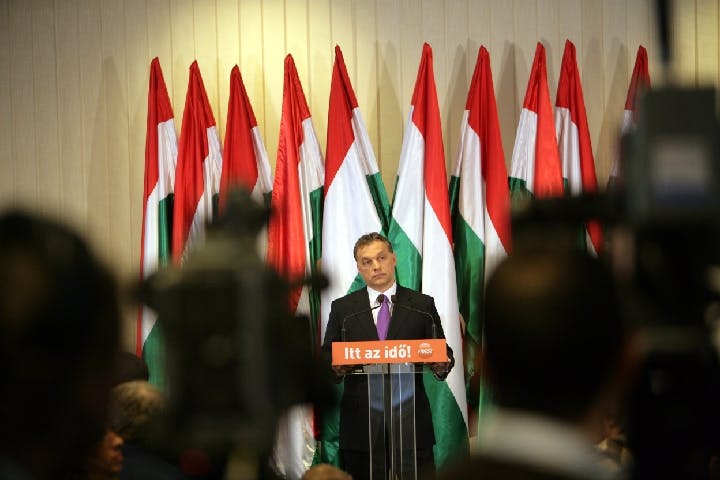Hungary’s slide into authoritarianism, and Europe’s toothless response
– Nicole Orttung
As Hungary’s leader stamps out democratic freedoms, the EU searches for the tools to respond. Can a dictatorship be born in the EU?
“Hello, Dictator!” At a summit in Riga this May, European Commission President Jean-Claude Juncker greeted Hungarian Prime Minister Viktor Orbàn with this pointed greeting. The EU has been warily observing Mr. Orbàn’s tightening grip on power since the leader of Hungary’s rightwing Fidesz Party took office in 2010 with a supermajority in Parliament.
Orbàn has not shied away from conflict with European Union leadership, declaring his intent to construct an “illiberal” democracy, putting national interests above individual freedom, aided by a new constitution and more than seven hundred associated laws that have substantially weakened checks on executive power. Orbàn’s constitution, drafted rapidly on an iPad by a close friend, has undermined the independence of the judiciary and frightened journalists into self-censorship.
The Fidesz Party leadership also rewrote the electoral law in its favor, giving the party an “undue advantage” in the 2014 elections, as the typically staid Organization for Security and Co-operation in Europe put it. The elections saw Fidesz hold onto its two-thirds parliamentary majority, allowing it to continue to rush through transformative legislation without giving civil society a chance to react — a phenomenon Eleni Kounalakis, former U.S. Ambassador to Hungary, referred to as the “two-thirds revolution” in her new book.
Though Orbàn claims to be shaping a new, non-Western type of democracy, Jan-Werner Müller of Princeton University observes that Orbàn is actually eroding freedom and the rule of law in Hungary. In a recent article published in the European Law Journal, Müller writes that in the absence of free media, truly competitive elections, and active civil society, a country is not a democracy at all, regardless of whether or not there are periodic elections.
Hungary’s turn towards authoritarianism presents an unprecedented challenge for the European Union, whose membership is based on core values including democracy and the rule of law. But beyond cheeky comments to the prime minister, how can the EU respond to a member state that violates the most fundamental aspects of what the organization stands for?
Ironically, critics frequently blast the EU for failing to be democratic itself. But the EU does not pretend to be a continent-wide democracy. Its legitimacy is based on the fact that national parliaments of liberal democracies freely voted to join and abide by the organization’s values and laws. On these grounds, the EU has an obligation, for the sake of all its member states, to preserve democracy within its borders.
Thus far, the European Union has not been successful in slowing Orbàn’s undemocratic reforms. In fact, the Hungarian prime minister has become increasingly defiant in recent weeks, threatening to build a fence along his border or reinstate the death penalty, two policies the EU fiercely opposes.
Article 7 of the Treaty on European Union is intended to address exactly this type of situation. When a member state fails to live up to central obligations by committing “serious and persistent breach” of the Union’s fundamental values, the treaty allows for a the suspension of that country’s voting rights in the European Council. However, no such suspension has ever been imposed; no state seems to want to risk Article 7 being used against it or a neighbor.
There are other legal safeguards, but they have thus far been ineffective. When a member state violates EU law, the European Commission can bring infringement cases to the European Court of Justice (ECJ). In 2011, the commission brought a case to the ECJ in response to Hungary lowering the retirement age for judges from 70 to 62 — a policy enacted with the clear goal of opening judicial positions for Fidesz appointees. The European Commission won the case on the basis of age discrimination, but did not make headway on the political issue it sought to address. Since the former judges had already stepped down, the Fidesz loyalists were able to keep their positions, further undermining the independence of the judiciary.
As existing legal instruments are either too politically charged or too indirect to be effective, Professor Müller lays out a new, more promising framework to preserve democracy and the rule of law within all EU member states. He proposes creating an impartial Copenhagen Commission (named after the criteria to join the EU) to provide consistent, comprehensive judgment as to the state of democracy and the rule of law within member states. To be effective, this Copenhagen Commission must be able to trigger meaningful action upon the release of a negative report, such as cutting EU-specific funds or imposing substantial fines.
The Copenhagen Commission’s challenge would be to fairly evaluate the strength of democracy within member states. There is no ideal model to which each nation can be compared, and no checklist of specific laws or institutions that can be applied, since each state’s unique historical, political, and legal context justifies a diverse set of government structures. If created, the organization must be careful to only condemn member states with a clear “track record of violating liberal-democratic political principles” in a way that cannot be reversed through domestic mechanisms. Hungary would be the first candidate for scrutiny.
The EU’s toothless response to Orbàn’s overreach has a high price. When Hungarians overwhelmingly voted to join the EU in 2004 (almost 84 percent of voters supported EU membership), they must have believed that membership would guarantee the success of their own fledgling democracy. For the sake of its own credibility and message to its own members and beyond, the EU must actively ensure that democracy and rule of law are not empty principles, but concrete realities for its citizens.
* * *
The Source: Jan-Werner Müller, “Should the EU Protect Democracy and the Rule of Law inside Member States?” European Law Journal, Vol. 21, No. 2, March 2015, pp. 141-160.
Photo courtesy of Northfoto/Shutterstock
